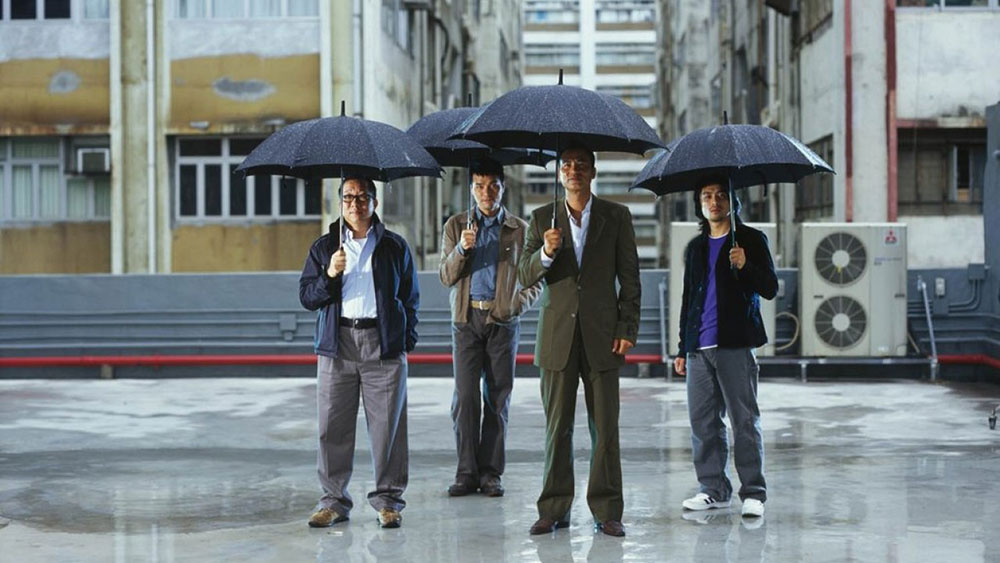A dialogue-scant, bossa-nova heavy riff on The Umbrellas of Cherbourg (1964) that doubles as a city symphony and gangster movie, Sparrow (2008) is Johnnie To at his most inventive. Known largely in the United States for his action-packed gangster movies, which swerve delicately between stunning compositions of thunderous violence and low-key buddy comedy, To’s career is more eclectic than his reputation usually gives him credit. Sparrow, a hodgepodge of diverse generic elements, inspired visual gags, and subtle political notes is not only one of his most bizarre films, but also something of a skeleton key for the rest of his work. It touches upon everything from the musically delivered political satire in Office (2015), to the male-bonding shenanigans of The Mission (1999) or Exiled (2006), to the darkly-accented city symphony of PTU (2003), to the wringing dry of Hollywood tropes in romantic comedies like Turn Left, Turn Right (2003). Sparrow is a film that is so delicately pitched between different moods and tones that its interplay of urban space, cinematic form, and genre tropes takes on the air of the uncanny.
To typically works in an improvised fashion and one can sense many of his films springing straight from his unconscious. In Sparrow, To builds a deceptively simple plot that serves as a pretext for all sorts of cinematic invention and set pieces. Simon Yam plays Kei, a suave pickpocket with a photography hobby who gets seduced by a mysterious Taiwanese crook, Lei (Kelly Lin Hsi-Lei). She wants to use him to free herself from her mob boss boyfriend (Lo Hoi-pang) who has locked up her passport. Working with many of the most familiar Hollywood romantic tropes—the meet cute, love at first sight, romantic predestination—Sparrow is less concerned with delivering a well-manicured plot than building a choreography around notions of sexual desire, urban alienation, and the changing face of Hong Kong.
Like the Ernst Lubitsch of Trouble in Paradise (1932), To is inexhaustibly fascinated by the metaphorical possibilities of cinema and turns sexual innuendo into an expressive, poetic artform. A camera tossed onto Kei’s bed by Lei runs rampant in its possibilities. Lipstick on a cigarette takes all the dimensions of a kiss. Intent on seducing each member of Kei’s gang into helping her, Lei stands behind one in an elevator and lets a bright yellow balloon drift down between their bodies. With every movement they make, the balloon squeaks and drifts lower; when it ultimately pops, it seals the pickpocket’s infatuation with Lei. A sparrow who keeps flying back into his cage every time Kei tries to free it allegorizes Kei’s inability to change his ways, Lei’s inability to escape the mob boss, and, in a more socio-political vein, To’s own inability to leave Hong Kong.
As an action filmmaker, To often combines a Sergio Leone-like sense of temporal compression, where long, drawn out moments of quiet expectation are contrasted with sudden outbursts of violence, and a laconic, existential cool reminiscent of Jean Pierre-Melville. In Sparrow, it’s as if these influences melded with the worlds of Jacques Tati and Jacques Demy. The icy Melville-ian grays are filled in with splashes of poppy technicolor and the affectless diligence of hitmen at work get replaced with a whimsical smiling camaraderie best evidenced by a laughter-filled attempt to fit four people on a bike that ends in one communal prat-fall. The film’s climax, a tense pickpocket duel in the rain, is a bravura sequence that epitomizes To’s art. With compact geometrical compositions, stunning slow-motion chiaroscuro photography, and a sharp sense of musical rhythm that puts as much emphasis on expectation as action, To creates a balletic choreography of umbrellas, bodies, and splashes of water. It’s as if he finally realized the synthesis between action sequences and musical numbers in a fully organic way.
To is commonly considered the last major Hong Kong filmmaker of his generation, the only one who fully survived the 1997 Handover and one of the very few who refused to migrate to the mainland Chinese film industry, choosing instead to make films about Hong Kong. A large part of this independence stems from the fact that he ran his own production company, Milkyway Image. In a recent Q&A at the Museum of Modern Art, To expressed that he feels too stifled with the current political situation and too uninspired to continue producing films. If that remains the unfortunate case, Sparrow will likely stand as one of the boldest and most idiosyncratic works from his exceptional career.
Sparrow screens this evening, September 28, at the Museum of Modern Art as part of the series “Chaos and Order: The Way of Johnnie To.”



